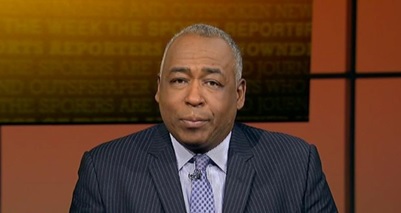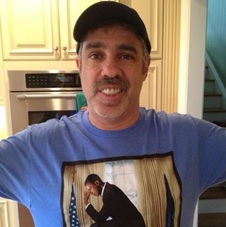Mike Stern is no stranger to the aircheck session, coaching talent for many years in a variety of situations. Along the way, one of the top challenges is ensuring that everyone part of a personality team understands his or her roles. On some shows, it’s the variable that makes the difference between being successful and merely average.
Today, Mike addresses the role definition dynamic, and reflects on one of the most challenging jobs on a personality show: the straight man.
Here’s his take. – FJ

Over the years, my wife and I have adopted a Sunday morning ritual of starting the day by watching The Sports Reporters on ESPN. If you aren’t familiar with the show, it’s a panel discussion featuring dynamic, outspoken, and bombastic sports columnists from major newspapers across the country talking about the latest events in the world of sports.
I’m not sure why I enjoy this show more than other talking heads fests. But when Mitch Albom from the Detroit Free Press, Mike Lupica from the New York Daily News, and Bob Ryan from the Boston Globe are sitting around the den, letting their opinions fly, it’s really great television.
 And that’s why I was so shocked and saddened when the news broke recently that John Saunders, the show’s long time, venerable host, had died suddenly. Saunders, whose ESPN credits include commentating on college football, college basketball, the NFL, the NBA and the NHL at different times in his career, was amazing in his role as ringleader, lion tamer, cat herder, and train conductor on Sunday mornings.
And that’s why I was so shocked and saddened when the news broke recently that John Saunders, the show’s long time, venerable host, had died suddenly. Saunders, whose ESPN credits include commentating on college football, college basketball, the NFL, the NBA and the NHL at different times in his career, was amazing in his role as ringleader, lion tamer, cat herder, and train conductor on Sunday mornings.
And now, having read the tributes from his colleagues after his passing, it’s clear I wasn’t the only one who appreciated how Saunders quietly and expertly managed this cast of sports bloviators. He was the consummate straight man – an unsung job where it’s about keeping it subtle and keeping it cool, rather than being loud, opinionated, and outrageous.
Recently in the Washington Post, a column by John Feinstein – John Saunders Showed How Good He Was By Not Telling Anyone About It – highly praised this ESPN straight man:
“Saunders was the guy every analyst wanted to work with. His ego was such that he had no problem setting up his analysts to be the stars of the broadcast, lobbing questions that made those he worked with sound smart.”
Lupica voiced similar sentiments in his column:
“He was tremendous and generous, allowing the rest of us to look good — sometimes no small feat, believe me.”
But it was Albom, who is not only a columnist but also a best-selling author and afternoon drive radio host on WJR-AM in Detroit, that really broke down Saunders’ role on The Sports Reporters.
“It is not easy to sit amid highly-opinionated, strongly-vocal sportswriters and not get buried in their wake. But John was always a presence, a strong, authoritative master of the ceremony, yet a guy who you instantly liked and trusted. He quizzed us, tested us, calmed us and honored us.”
This is not to say that Saunders was passive or didn’t have his own opinions. In the show-ending segment called “Parting Shots” where each member of the panel fired off a quick monologue about a current sports story, it was often Saunders’ comments that were the most insightful. And on the first show following his surprise death, all four high-profile panelists agreed Saunders often put aside his own opinions for the sake of the show; a rare show of restraint on ESPN, and something we too often overlook in radio.
 When we architect a new radio show, the focus is always on finding unique, talented, funny people. We’re looking for unabashed humor, memorable characters, and performers with the ability to make the phones ring, generate buzz, and engender loyalty.
When we architect a new radio show, the focus is always on finding unique, talented, funny people. We’re looking for unabashed humor, memorable characters, and performers with the ability to make the phones ring, generate buzz, and engender loyalty.
As we all know, true comedic stars are not easy to come by. But in that scramble to find talent that will cut through, it’s easy to overlook the incessant truth that every loose cannon needs a foil to help them shine the brightest. Someone to keep the discussion on track, stop opinions from going too far, maintain momentum, and point out absurdity and the boundary lines. And in the process, the straight man (or woman) helps shape and create great entertainment.
Sometimes, it’s a thankless job because it’s the class clown in the studio who attracts the accolades and attention. And too often, the so-called straight man is guilty of competing with the rest of the cast for mic time or that final zinger, and in the process, throwing the entire show off balance.
John Saunders knew his role and played it expertly. A big reason great straight men aren’t easy to find is because putting opinions and ego aside for the good of a show requires talent, finesse, restraint, and class – qualities that are often in short supply in the world of entertainment.
If you’re a straight man – or straight woman – relish and embrace your role. From Dean Martin to Desi Arnaz to WKRP’s Gary Sandy to Tommy Smothers to Teller to Gary Dell’Abate and Robin Quivers, there’s a long history of truly talented people who understood how they quietly carry their shows while letting the big stars shine.
If you can ever get in a word edgewise, just ask The Sports Reporters.
Mike Stern is a Jacobs Media veteran, consulting the company’s Rock and Alternative stations, as well as coaching talent. You can reach Mike here.
- What Is It With Female Robot DJs? - April 30, 2025
- Why “Dance With Those Who Brung You” Should Be Radio’s Operating Philosophy In 2025 - April 29, 2025
- The Exponential Value of Nurturing Radio Superfans - April 28, 2025




Could not agree more, Mike. The best talent I’ve ever worked with shone because there was a measured, steady presence who had their back and their best interest in mind. It’s a really important role.
Thanks Beverlee. It’s a good reminder for me when I’m talking with Phil and Cherie or Nick and Big J that defining roles and having someone who can be the steady hand is important.